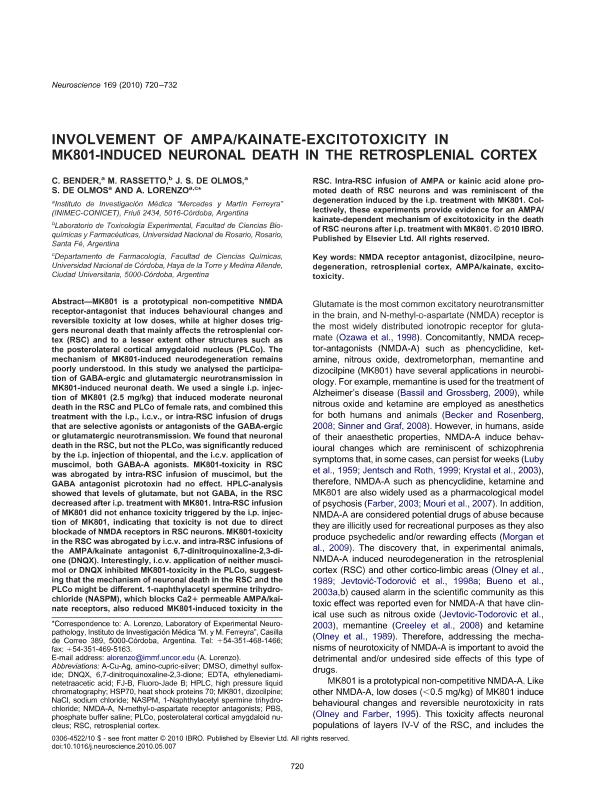Artículo
Involvement of AMPA/kainate-excitotoxicity in MK801-induced neuronal death in the retrosplenial cortex
Bender, Crhistian Luis ; Rassetto, M.; de Olmos, Jose Severo Ramon
; Rassetto, M.; de Olmos, Jose Severo Ramon ; de Olmos, Soledad
; de Olmos, Soledad ; Lorenzo, Alfredo Guillermo
; Lorenzo, Alfredo Guillermo
 ; Rassetto, M.; de Olmos, Jose Severo Ramon
; Rassetto, M.; de Olmos, Jose Severo Ramon ; de Olmos, Soledad
; de Olmos, Soledad ; Lorenzo, Alfredo Guillermo
; Lorenzo, Alfredo Guillermo
Fecha de publicación:
08/2010
Editorial:
Pergamon-Elsevier Science Ltd
Revista:
Neuroscience
ISSN:
0306-4522
Idioma:
Inglés
Tipo de recurso:
Artículo publicado
Clasificación temática:
Resumen
MK801 is a prototypical non-competitive NMDA receptor-antagonist that induces behavioural changes and reversible toxicity at low doses, while at higher doses triggers neuronal death that mainly affects the retrosplenial cortex (RSC) and to a lesser extent other structures such as the posterolateral cortical amygdaloid nucleus (PLCo). The mechanism of MK801-induced neurodegeneration remains poorly understood. In this study we analysed the participation of GABA-ergic and glutamatergic neurotransmission in MK801-induced neuronal death. We used a single i.p. injection of MK801 (2.5 mg/kg) that induced moderate neuronal death in the RSC and PLCo of female rats, and combined this treatment with the i.p., i.c.v., or intra-RSC infusion of drugs that are selective agonists or antagonists of the GABA-ergic or glutamatergic neurotransmission. We found that neuronal death in the RSC, but not the PLCo, was significantly reduced by the i.p. injection of thiopental, and the i.c.v. application of muscimol, both GABA-A agonists. MK801-toxicity in RSC was abrogated by intra-RSC infusion of muscimol, but the GABA antagonist picrotoxin had no effect. HPLC-analysis showed that levels of glutamate, but not GABA, in the RSC decreased after i.p. treatment with MK801. Intra-RSC infusion of MK801 did not enhance toxicity triggered by the i.p. injection of MK801, indicating that toxicity is not due to direct blockade of NMDA receptors in RSC neurons. MK801-toxicity in the RSC was abrogated by i.c.v. and intra-RSC infusions of the AMPA/kainate antagonist 6,7-dinitroquinoxaline-2,3-dione (DNQX). Interestingly, i.c.v. application of neither muscimol or DNQX inhibited MK801-toxicity in the PLCo, suggesting that the mechanism of neuronal death in the RSC and the PLCo might be different. 1-naphthylacetyl spermine trihydrochloride (NASPM), which blocks Ca2+ permeable AMPA/kainate receptors, also reduced MK801-induced toxicity in the RSC. Intra-RSC infusion of AMPA or kainic acid alone promoted death of RSC neurons and was reminiscent of the degeneration induced by the i.p. treatment with MK801. Collectively, these experiments provide evidence for an AMPA/kainate-dependent mechanism of excitotoxicity in the death of RSC neurons after i.p. treatment with MK801.
Archivos asociados
Licencia
Identificadores
Colecciones
Articulos(INIMEC - CONICET)
Articulos de INSTITUTO DE INV. MEDICAS MERCEDES Y MARTIN FERREYRA
Articulos de INSTITUTO DE INV. MEDICAS MERCEDES Y MARTIN FERREYRA
Citación
Bender, Crhistian Luis; Rassetto, M.; de Olmos, Jose Severo Ramon; de Olmos, Soledad; Lorenzo, Alfredo Guillermo; Involvement of AMPA/kainate-excitotoxicity in MK801-induced neuronal death in the retrosplenial cortex; Pergamon-Elsevier Science Ltd; Neuroscience; 169; 2; 8-2010; 720-732
Compartir
Altmétricas



